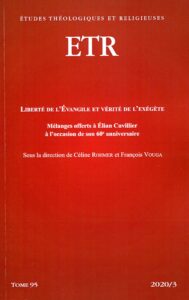En préparation d’un commentaire de la Première épître aux Corinthiens, Daniel Gerber se saisit des notions de vérité et de liberté dans un franc dialogue avec l’homme de Tarse. Sa manière de se re-situer par rapport à la « vérité » de l’Évangile paulinien le conduit d’abord à préciser son propre travail exégétique de dénostrification comme une vivifiante distanciation critique avec les épîtres de l’apôtre. Cette tâche intellectuelle présuppose la « liberté » de l’exégète – une liberté qui, particulièrement en tradition réformée, oblige l’exégète à un honnête et rigoureux travail. Aussi la quête de la « vérité » de l’Évangile paulinien en passe-t-elle nécessairement par le maniement de différents outils d’analyse critique (méthode historico-critique, étude de la performance, prise en compte des résultats archéologiques). Seul un exigeant travail d’interprétation critique peut offrir de redécouvrir sous un jour nouveau la figure singulière de l’apôtre et d’en mesurer la pertinence théologique et anthropologique pour nos contemporains.
Mots-clés : 1 Corinthiens, vérité de l’Évangile, liberté de l’exégète, Évangile paulinien, analyse de la performance, méthode historico-critique, archéologie, l’homme de Tarse, « saint-Paul ».
“Truth” of the Gospel of Paul and “liberty” of the exegete. Some dotted lines on the route of a New Testament writer
Preparing a commentary on the First Letter to the Corinthians, Daniel Gerber takes up the notions of truth and of liberty in a frank dialogue with the man of Tarsus. His way of redefining himself in relation to the “truth” of the Gospel of Paul leads him to first define his own exegetic work of denostrification as a refreshing critical distanciation from the apostle’s letters. This intellectual task presupposes the “liberty” of the exegete – a liberty which particularly in Reformed tradition, makes the exegete do honest and rigorous work. Thus the quest for the “truth” of Paul’s Gospel necessarily involves using various forms of critical analysis (historical-critical method, study of the performance, taking into account archeological results). Only an exacting critical interpretation can ensure the discovery in a new light of the unique figure of the Apostle and measure the theological and anthropological pertinence for our contemporaries.
p. 395-404
Author
GERBER Daniel
Daniel GERBER est professeur d'exégèse de Nouveau Testament à la Faculté de théologie protestante de l'Université des Sciences humaines de Strasbourg, membre de l’Équipe de Recherches en Exégèse Biblique (EREB) et de l'École doctorale de Théologie et de Sciences Religieuses (E.D. 270).
